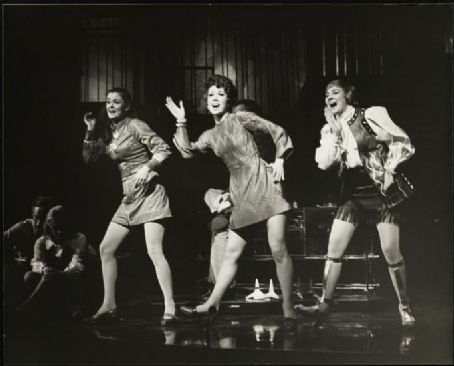Prince Of Broadway
He didn't sing, he didn't dance, he didn't act. He didn't write, he didn't compose, he didn't even choreograph. And yet Harold Prince, who just died, may be the most significant figure in Broadway musicals of our time.
For years he's been the Grand Old Man of the Great White Way, but when he started he was the boy genius. He was even mocked for being so young and powerful in the semi-musical Say, Darling (1958), via a character played by Robert Morse.
Born in 1928, Prince grew up in a time when the theatre was still (though barely) a viable option for those who loved show business. His mentor was George Abbott (talk about your Grand Old Man) who hired the hard-working Prince as an assistant stage manager. Prince worked on musicals such as Call Me Madam (1950) and Wonderful Town (1953) before teaming up with Robert E. Griffith--who was a generation older--to produce a series of major titles, including The Pajama Game (1954), Damn Yankees (1955), West Side Story (1957) (which Prince rescued when he got a call from his friend Stephen Sondheim telling him the original producer had backed out) and Fiorello! (1959). All these shows won Tonys, the last a Pulitzer.
The two had a golden touch, producing almost nothing but hits. Griffith died in 1961, and Prince went out on his own, trying his hand at straight plays, including Take Her, She's Mine (1961), as well as the hit musical A Funny Thing Happened On The Way To The Forum (1962)--a show that was failing so badly out of town that most producers would have closed it.
For some time he'd been planning to direct, and he made his debut--inauspiciously--in a musical he didn't produce, A Family Affair (1962). He next directed (and produced) She Loves Me (1963). The show didn't make its money back, but was a beloved production of a charming musical that's been revived three times on Broadway. By all accounts, he directed with a sure hand.
He next produced the huge hit Fiddler On The Roof (1964)--he wasn't quite ready to direct this sort of project, and sought out Jerome Robbins. But soon after he became a regular director, and some years down the road all but gave up producing. As George Abbott used to say, the problems of a director are more pleasant than the problems of a producer.
Thus he directed the musical Baker Street (1965) and the well-reviewed It's A Bird It's A Plane...It's Superman (1966), neither of which were hits. His next show was the one that put him on the map--Cabaret (1966), which ran for three years and won the Tony for Best Musical and Best Direction. (Prince and his shows would win so many awards you'll pardon me if I don't list them all.)
The last play in the 60s that he produced and directed was Zorba (1968), but it was in the 1970s that he'd really show what he could do. With friend and composer Stephen Sondheim, he put on five musicals that revolutionized the form: Company (1970), Follies (1971), A Little Night Music (1973), Pacific Overtures (1976) and Sweeney Todd (1979). Each a breakthrough, each completely different from the last.
It should be noted they weren't all hits. In fact, only Company and A Little Night Music turned a profit in their original run. But all had memorable scores and memorable productions, and are still being done to this day. Sondheim brought a new level of sophistication to musicals, while Prince rose to new heights with his conceptual stagings (which, unlike contemporaries Robbins and Bob Fosse, were not necessarily built around choreography).
Meanwhile, he was directing other shows, such as the revival of Candide in 1974 and On The Twentieth Century in 1978. He even tried his hand at directing films, though that didn't quite stick.
The last Prince/Sondheim Broadway collaboration, Merrily We Roll Along (1981), was a their biggest flop. While it's got a great score (and a poor book), the two decided to call it quits, perhaps believing Broadway was sick of them. By that point, however, Prince had already directed a blockbuster in 1979 that pointed in what direction the musical was heading--Andrew Lloyd Webber's modern opera Evita.
For most of the 1980s, however, it seemed like Prince couldn't buy a hit. One after another his shows--A Doll's Life* (1982), Grind (1985), Roza (1987)--fell by the wayside. Then, once again teamed with Lloyd Webber, he directed the biggest hit of all time--The Phantom Of The Opera, which opened in 1988 and is still running.
In the 1990s he continued to do major work, including Kiss Of The Spider Woman (1993) and a well-received revival of Showboat (1994).
He kept working through the years, both in New York and overseeing productions of his shows around the world. In 2017, he updated his memoir (originally published in 1974), Sense Of Occasion. That same year, Broadway saw a show that was long in the making--Prince Of Broadway, a musical revue, directed by Prince himself, made up of numbers from shows he'd produced and/or directed. But he didn't need a tribute. The many thousands of performances of his shows, from the 1950s to today, were the real tribute.
*This was a musical sequel to A Doll's House, and only managed five performances. I happened to be walking around Broadway when it closed, and saw people at the stage door carrying out costumes. They looked sad.






0 Comments:
Post a Comment
<< Home